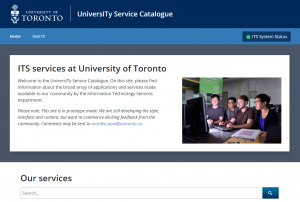Unpacking Team Effectiveness: Stop-Start-Continue
At Online Learning Strategies we know that “Teamwork” is one of our ITS core values and we aim to promote effective communication, knowledge sharing and openness to different perspectives and expertise. But should we pause more often to reflect on teamwork in terms of “how is our team working?”
A great example of this type of reflective practice was recently undertaken by a cross-unit ITS team who found themselves on a join project overlapping several portfolios. The group that formed had a unique mix of skill sets from across ITS units, including project management, governance, shared services delivery, communications and web design. The task at hand was an agile development of a proof of concept for a much needed new UniversITy Service Catalogue.
While basic project management processes were in place, there was need for considerable dialogue and coordination to pull the necessary resources and skills together to achieve our shared goal. We learned a great deal from one another, with moments of frustration and moments of success along this leg of the journey.
What were the enablers that made this effective team formation possible? In the home stretch to completion of phase one, the group took time out to do a team survey and group debrief on what could change, what should be avoided, and what had worked well, with a mind to informing our future undertakings. This is known as a Start – Stop – Keep Retrospective and is often used in agile development and other working group contexts. We discovered our strengths were building of trust and conflict resolution, both foundational characteristics of high-performance teams. A number of practical strategies related to scope and resource definition, as well as potential efficiencies in meeting structure were identified.
You may consider borrowing this framework to take the time to “check-in” with your own project team. While we are working remotely, it is more important than ever to ensure we are aware of the factors that are critical to group progress and opportunities for improvement. Try it!

